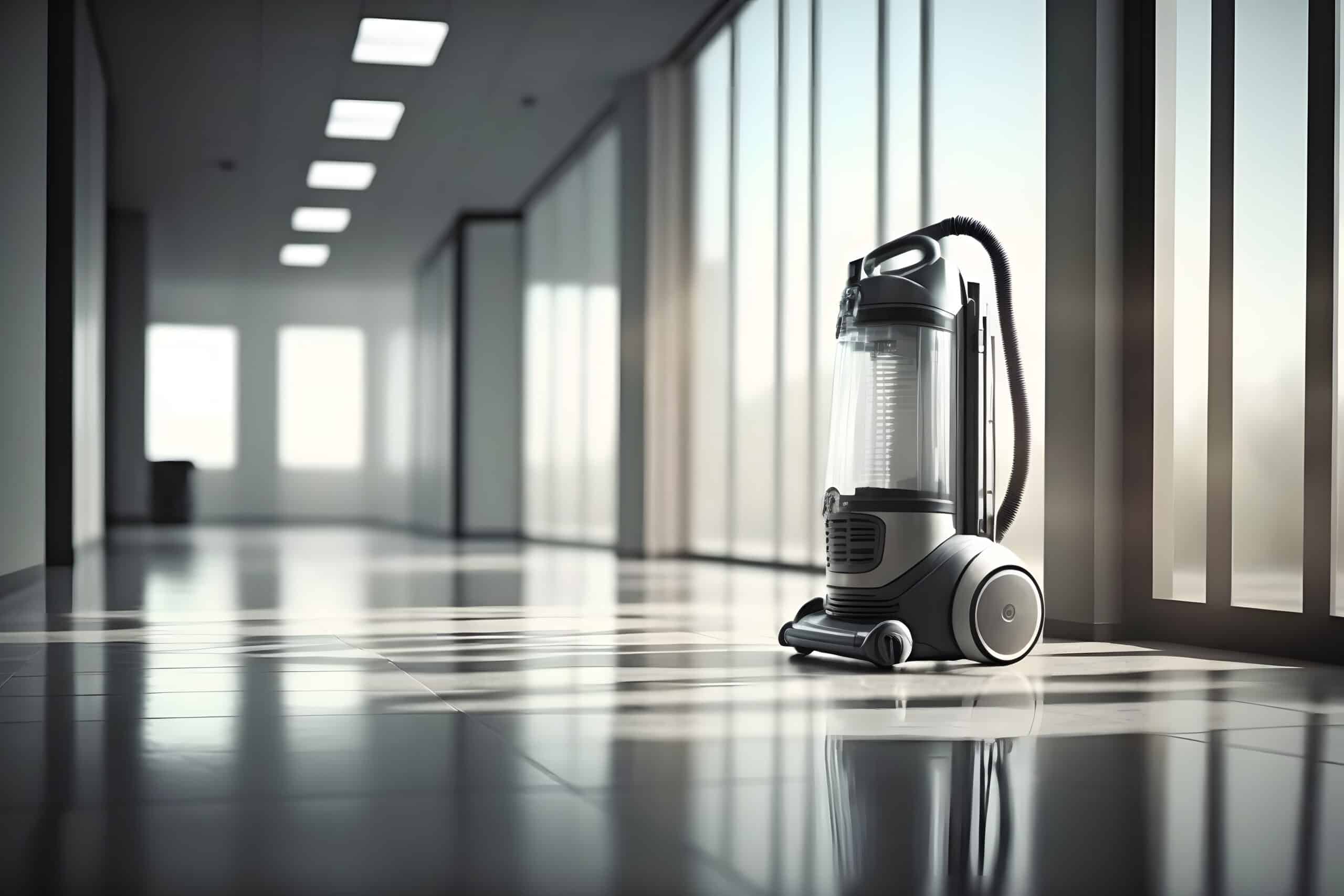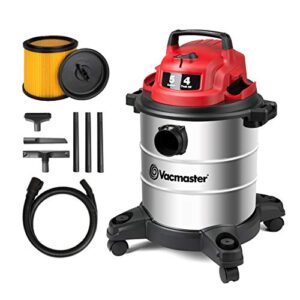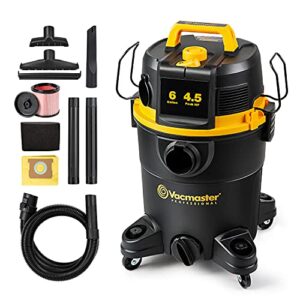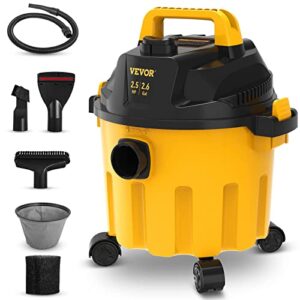What is a Shop Vacuum?
Key Takeaways
- A shop vacuum is a powerful cleaning tool designed for heavy-duty tasks and can handle both wet and dry messes.
- Shop vacuums have several features that set them apart from regular vacuums, including tank size, wet/dry capabilities, tank material, suction power, attachments, airpower, detachable blowers, and other included features.
- Shop vacuums differ from regular vacuums in terms of cleaning scope, suction power, size and durability, noise level, and filters and attachments.
A shop vacuum, also known as a wet/dry vacuum or a utility vacuum, is a powerful cleaning tool designed for heavy-duty tasks. It is specifically built to handle both wet and dry messes, making it a versatile option for various cleaning needs.
Features of a Shop Vacuum
Shop vacuums come with several features that set them apart from regular vacuums. These features include:
- Tank Size: Shop vacuums are available in a range of tank sizes, typically ranging from 2 to 15 gallons or more. The larger the tank, the more debris it can hold before needing to be emptied.
- Wet/Dry Capabilities: Unlike regular vacuums that are designed primarily for dry cleaning, shop vacuums have the ability to handle both wet and dry messes. This makes them ideal for cleaning up spills, flooded areas, or even unclogging sinks.
- Tank Material: Shop vacuums are constructed using durable materials such as stainless steel or polypropylene. These materials ensure the vacuum can withstand the rigors of heavy-duty cleaning tasks and resist corrosion.
- Suction Power: Shop vacuums are known for their powerful suction capabilities. The suction power is measured in cubic feet per minute (CFM), with higher CFM values indicating stronger suction. This high suction power allows shop vacuums to efficiently pick up large debris, dust, dirt, and liquids.
- Attachments: Shop vacuums often come with a variety of attachments to enhance their cleaning capabilities. These attachments can include crevice tools, extension wands, utility nozzles, and brushes, allowing users to clean different surfaces and hard-to-reach areas effectively.
- Airpower: The airpower of a shop vacuum is also measured in CFM. It refers to the volume of air the vacuum can move in a minute. Higher CFM values indicate better airflow and suction performance.
- Detachable Blowers: Some shop vacuums also feature detachable blowers, which allow users to switch between vacuuming and blowing functions. This can be particularly useful for tasks such as removing debris from outdoor spaces or blowing leaves.
- Other Included Features: Shop vacuums may offer additional features such as separate blower outputs, built-in drain ports for easy emptying of liquids, or even features like variable speed controls.
How a Shop Vacuum Differs from a Regular Vacuum
While both shop vacuums and regular vacuums serve the purpose of cleaning, they differ in several key aspects:
- Cleaning Scope: Shop vacuums are designed for heavy-duty cleaning tasks, making them suitable for workshops, construction sites, and other environments where large debris, dirt, and liquids need to be tackled. Regular vacuums, on the other hand, are more suitable for everyday cleaning needs and are equipped with features like beater brushes for efficiently capturing dirt from carpets.
- Suction Power: Shop vacuums offer significantly higher suction power compared to regular vacuums. The CFM figures of shop vacuums can reach up to 197 CFM, while regular vacuums typically offer an effective suction power of around 83 CFM.
- Size and Durability: Shop vacuums tend to be larger and bulkier than regular vacuums due to their heavy-duty components. This makes them less maneuverable but more durable and capable of handling tough cleaning tasks. Regular vacuums, on the other hand, are designed to be compact and lightweight, allowing for easy maneuverability around the home.
- Noise Level: Shop vacuums often produce higher noise levels due to their powerful motors and larger size. Regular vacuums, on the other hand, have generally quieter operations, which is more suitable for residential use.
- Filters and Attachments: Shop vacuums typically come with foam sleeves and reusable filters, allowing them to handle heavy debris and liquids effectively. Regular vacuums, on the other hand, offer specialized attachments like beater brushes for carpet cleaning and advanced filtration systems, such as HEPA filters, which are designed to capture fine dust particles.
Shop Vacuums for Wet and Dry Messes
One of the key advantages of shop vacuums is their ability to handle both wet and dry messes. This makes them highly versatile for a range of cleaning tasks. Whether you need to clean up a spilled drink, remove water from a flooded basement, or tackle a dusty workshop, a shop vacuum can handle it all.
Conclusion
A shop vacuum is a powerful cleaning tool designed for heavy-duty cleaning tasks. With its wet/dry capabilities, strong suction power, and durable construction, it is a reliable choice for cleaning workshops, construction sites, and other environments where large debris and liquids need to be tackled. While regular vacuums are more suitable for everyday cleaning needs, shop vacuums excel in handling tough messes. With the right attachments and features, a shop vacuum can become an indispensable tool in any cleaning arsenal.
Related Websites:
FAQs:
Q: Why should I consider learning about shop vacuums?
Learning about shop vacuums can help you make an informed decision when purchasing one. Shop vacuums offer unique benefits and are designed for handling heavier debris and liquids, making them useful in workshops, garages, and construction sites.
Q: What is a shop vacuum and what are its primary uses?
A shop vacuum is a powerful vacuum cleaner designed for heavy-duty applications. It is primarily used for cleaning up larger debris, dust, dirt, and even liquids. Some common uses include cleaning workshops, garages, construction sites, and handling various messes that traditional household vacuums cannot handle.
Q: How does a shop vacuum work and what are its key components?
A shop vacuum works by generating suction through a motor that creates airflow. This airflow helps pick up debris and directs it into the vacuum’s collection tank. The key components involved in the suction process include the motor, intake port, collection tank, and filtration system that prevents debris from entering the motor.
Q: What are the benefits of using a shop vacuum?
Using a shop vacuum offers several advantages over traditional household vacuums. They have the ability to handle heavier debris, such as wood chips and nails, as well as liquids. Shop vacuums are designed to withstand more robust use and are ideal for workshops, garages, and construction sites where messes can be more challenging to clean.
Q: What are the different types of shop vacuums available and how do I choose the right one?
There are various types and sizes of shop vacuums available, ranging from small portable models to larger, more powerful units. When choosing the right shop vacuum for your needs, consider factors such as capacity, power, filtration system, and additional features like attachments and mobility options.






